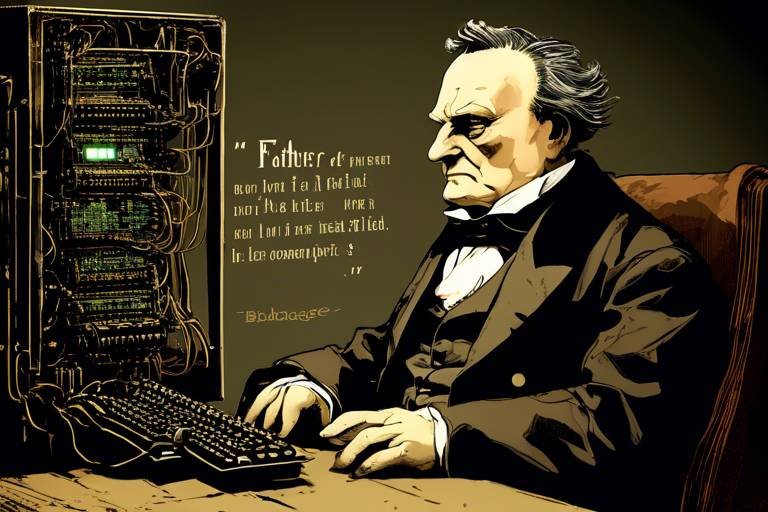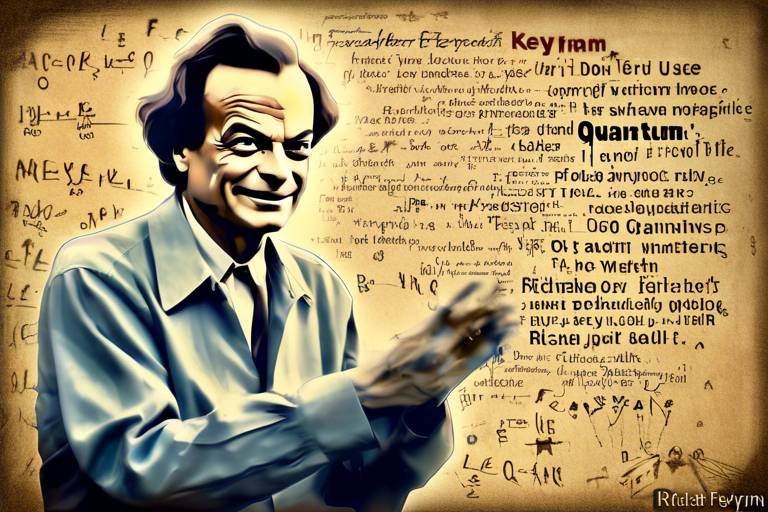Babbage: The Father of the Computer
Charles Babbage, often referred to as the "Father of the Computer," was a visionary mathematician, engineer, and inventor whose pioneering work laid the foundation for modern computing technology. Born in 1791 in London, England, Babbage displayed a keen interest in mathematics and mechanics from an early age. His insatiable curiosity and innovative spirit led him to develop groundbreaking inventions that would revolutionize the world of computing.
One of Babbage's most notable creations was the Difference Engine, a mechanical device designed to perform complex mathematical calculations with precision and speed. This invention marked a significant advancement in computational technology, setting the stage for the development of more sophisticated computing machines in the future.
However, Babbage's true masterpiece was the Analytical Engine, a revolutionary concept that is widely regarded as the world's first general-purpose mechanical computer. This remarkable invention had the capability to store data, perform arithmetic operations, and execute instructions, foreshadowing the fundamental principles of modern computing.
Despite his visionary ideas and innovative designs, Babbage faced numerous challenges in bringing his ambitious projects to fruition. The complexity and scale of the Analytical Engine, coupled with technological limitations of the time, prevented him from completing this groundbreaking invention during his lifetime.
Nevertheless, Babbage's contributions to the field of computing were profound and far-reaching. His pioneering work not only inspired future generations of inventors and engineers but also laid the groundwork for the technological advancements that would shape the modern world.
Following his death in 1871, Charles Babbage's legacy continued to resonate in the world of technology. His collaboration with Ada Lovelace, the world's first computer programmer, further solidified his status as a visionary pioneer in the field of computing.
In recent years, there has been a resurgence of interest in Babbage's work, with modern engineers and historians revisiting his designs and concepts to explore their relevance in today's digital age. The enduring legacy of Charles Babbage serves as a testament to his enduring impact on the world of technology and innovation.

Early Life and Education
Exploring the life and contributions of Charles Babbage, a key figure in the history of computing. Learn about his inventions, impact on modern technology, and the legacy he left behind.
Charles Babbage was born on December 26, 1791, in London, England. From a young age, he showed a keen interest in mathematics and mechanics, often tinkering with machines and devices. His early education at home by private tutors laid the foundation for his future pursuits in the field of engineering.
Attending Cambridge University, Babbage further honed his mathematical skills and developed a passion for analytical thinking. His exposure to the works of prominent mathematicians and scientists of his time influenced his approach to problem-solving and innovation.
During his formative years, Babbage traveled extensively across Europe, engaging with leading intellectuals and exploring new ideas in mathematics and technology. These experiences broadened his perspective and fueled his ambition to revolutionize the world of computing.
Learn about Babbage's groundbreaking invention, the Difference Engine, and its significance in the development of computing machines.
Explore the design and concept of Babbage's Analytical Engine, considered the first general-purpose mechanical computer.
Understand why some of Babbage's ambitious projects, like the Analytical Engine, were never completed during his lifetime.
Examine how Babbage's work laid the foundation for modern computing and influenced future generations of inventors and engineers.
Learn about the posthumous recognition of Babbage's contributions to the field of computing and his enduring legacy in technology.
Discover the collaborative relationship between Charles Babbage and Ada Lovelace, who is considered the world's first computer programmer.
Explore how Babbage's designs have been revisited and reconstructed in modern times, showcasing the enduring relevance of his ideas.

Difference Engine
Charles Babbage's is a pivotal invention that revolutionized the world of computing. This mechanical device was designed to automatically compute and print mathematical tables, eliminating the errors that often occurred in manual calculations. The marked a significant advancement in the field of mathematics and laid the groundwork for the development of more complex computing machines.
One of the key innovations of the was its use of the method of finite differences to calculate polynomial functions. This method allowed for the accurate and efficient computation of values, making it a valuable tool for scientists, engineers, and mathematicians. Babbage's meticulous attention to detail in the design of the ensured its reliability and precision in performing calculations.
Although the was never fully completed during Babbage's lifetime due to various challenges, including funding issues and technological limitations, its conceptual design had a profound impact on the future of computing. The principles and mechanisms incorporated in the influenced subsequent generations of inventors and engineers, shaping the evolution of computational technology.

Analytical Engine
Charles Babbage's stands as a testament to his innovative spirit and foresight in the realm of computing. This visionary machine was designed to perform various calculations and execute complex tasks, laying the foundation for modern computers as we know them today. The Analytical Engine was a marvel of its time, with its intricate system of gears, wheels, and mechanical components working in harmony to process data and produce results.
What set the Analytical Engine apart was its ability to store and manipulate data, a concept that was revolutionary in the 19th century. Babbage envisioned a machine that could follow instructions, perform operations, and even make decisions based on predefined conditions. This level of programmability was unheard of at the time and marked a significant leap forward in the evolution of computing technology.
The design of the Analytical Engine included key components such as the mill, which served as the central processing unit, and the store, which functioned as memory. These elements worked together to perform arithmetic operations, store intermediate results, and execute sequential instructions. Babbage's vision for a universal computing machine laid the groundwork for the digital computers that would later dominate the technological landscape.

Unfinished Projects
Charles Babbage was a visionary ahead of his time, but even he faced challenges that prevented some of his most ambitious projects from reaching completion. Despite his brilliant mind and innovative ideas, Babbage's unfinished projects remain a testament to the complexities of bringing revolutionary concepts to fruition.
One of the primary reasons for the incompleteness of Babbage's projects, such as the Analytical Engine, was the technological limitations of his era. The lack of advanced manufacturing capabilities and precision engineering tools hindered the construction of these intricate machines, leading to delays and ultimately, abandonment of some endeavors.
Additionally, Babbage's relentless pursuit of perfection and his constant revisions to designs often prolonged the development process. His quest for precision and efficiency, while admirable, also contributed to the protracted timelines of his projects, making it challenging to see them through to completion.
Moreover, the financial constraints faced by Babbage posed significant obstacles to the realization of his grand visions. Securing funding for his innovative endeavors proved to be a recurring challenge, limiting his ability to dedicate resources and manpower to his projects consistently.
Despite the setbacks and unrealized potential of his unfinished projects, Babbage's legacy endures as a beacon of inspiration for future generations of inventors and technologists. His visionary concepts laid the groundwork for the digital age we now inhabit, showcasing the enduring impact of his pioneering work in the field of computing.

Impact on Computing
Charles Babbage's impact on computing can be likened to a ripple effect in a vast ocean, with his innovations creating waves that are still felt in the technology landscape today. His pioneering work laid the groundwork for the development of modern computers, revolutionizing the way we process information and solve complex problems.
One of Babbage's most significant contributions was the conceptualization of the Analytical Engine, a marvel of engineering that embodied the principles of modern computing. This revolutionary machine, although never fully realized during his lifetime, planted the seeds for future inventors to further explore the possibilities of mechanical computation.
Babbage's visionary ideas not only inspired the next generation of engineers and inventors but also sparked a wave of innovation that led to the creation of the first programmable computers. His emphasis on precision, accuracy, and systematic thinking set a standard for computational machines that continues to shape the field of computing today.
Moreover, Babbage's relentless pursuit of perfection and his unwavering dedication to his craft serve as a testament to the power of perseverance and innovation. His legacy serves as a reminder that great ideas, no matter how ahead of their time, have the potential to transform the world and leave an indelible mark on history.

Recognition and Legacy
Charles Babbage's contributions to the field of computing have earned him a well-deserved place in history as the "Father of the Computer." His innovative ideas and pioneering work have left an indelible mark on modern technology, shaping the way we live and work today. Babbage's visionary concepts laid the groundwork for the development of sophisticated computing machines, revolutionizing the way data is processed and analyzed.
One of the most significant aspects of Babbage's legacy is his relentless pursuit of perfection in his inventions. Despite facing numerous challenges and setbacks, he remained dedicated to pushing the boundaries of what was thought possible in the realm of computing. His unwavering commitment to excellence serves as a source of inspiration for aspiring inventors and engineers, highlighting the importance of perseverance and determination in achieving groundbreaking innovations.
Babbage's collaboration with Ada Lovelace, often referred to as the world's first computer programmer, further solidified his legacy in the field of computing. Their partnership resulted in the development of programs for the Analytical Engine, showcasing the potential of combining mathematical algorithms with mechanical computing devices. This partnership not only demonstrated the power of interdisciplinary collaboration but also paved the way for future advancements in computer programming and software development.
Despite some of Babbage's projects remaining unfinished during his lifetime, his ideas have continued to influence generations of inventors and engineers. The modern resurrections of his designs, such as the reconstruction of the Difference Engine and Analytical Engine, serve as a testament to the enduring relevance of his visionary concepts. By revisiting and reimagining Babbage's work, contemporary technologists pay homage to his innovative spirit and commitment to pushing the boundaries of technological advancement.

Ada Lovelace Collaboration
One of the most notable collaborations in the history of computing was between Charles Babbage and Ada Lovelace. Ada Lovelace, a mathematician and writer, worked closely with Babbage on his Analytical Engine, contributing significantly to its development and understanding. Her work on the engine's algorithms and programs earned her the title of the world's first computer programmer.
Ada Lovelace's collaboration with Charles Babbage extended beyond mere assistance; she expanded on Babbage's ideas, providing critical insights and innovations that shaped the future of computing. Their partnership exemplified the power of interdisciplinary collaboration, combining mathematics, engineering, and creativity to push the boundaries of technology.
The relationship between Babbage and Lovelace was not only professional but also personal, with a shared passion for advancing the field of computing. Their joint efforts laid the groundwork for the digital age, setting a precedent for future collaborations and innovations in the world of technology.

Modern Resurrections
Modern Resurrections of Charles Babbage's designs have sparked a renewed interest in his visionary concepts. Engineers and historians alike have delved into Babbage's plans, bringing them to life in the digital age. One notable example is the reconstruction of the Difference Engine, a project that showcases the intricate mechanical design and mathematical precision of Babbage's work. These modern resurrections serve as a testament to Babbage's ahead-of-his-time thinking and continue to inspire innovation in the field of computing.
Frequently Asked Questions
- What were Charles Babbage's major contributions to computing?
Charles Babbage is renowned for inventing the Difference Engine, a mechanical calculator designed to tabulate polynomial functions. He also conceptualized the Analytical Engine, considered the first general-purpose mechanical computer, laying the foundation for modern computing.
- Why were some of Babbage's projects left unfinished?
Despite his innovative ideas, Charles Babbage faced challenges in securing funding and overcoming technical limitations of his time, which led to the incomplete realization of projects like the Analytical Engine. However, his visionary concepts greatly influenced the future of computing.
- How did Charles Babbage collaborate with Ada Lovelace?
Charles Babbage collaborated with Ada Lovelace, who is recognized as the world's first computer programmer, on the Analytical Engine. Lovelace translated and annotated Babbage's work, demonstrating the machine's potential for more than just mathematical calculations.
- What is Charles Babbage's legacy in modern technology?
Charles Babbage's legacy in modern technology is profound, as his pioneering concepts and designs have influenced the development of computers and paved the way for future innovations in the field of computing. His visionary ideas continue to inspire inventors and engineers today.



















